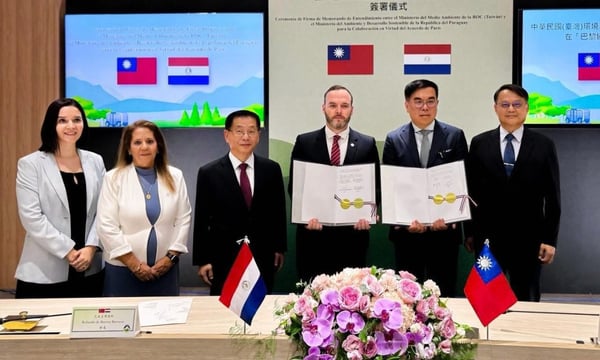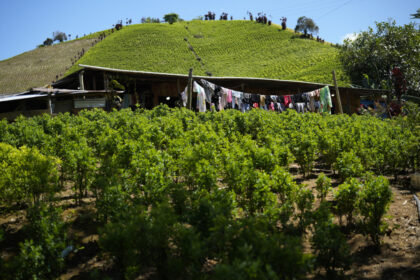When Taiwan and Paraguay signed a memorandum of understanding (MOU) on climate governance under the Paris Agreement in September, it marked a historic milestone. This is the first bilateral climate agreement of its kind for Taiwan, establishing a concrete mechanism for the island to engage meaningfully in global climate governance despite its exclusion from the United Nations system. Beyond the symbolism of diplomatic friendship, the MOU demonstrates how Taiwan leverages law, transparency, and ethical governance to build credibility, even under structural constraints.
Taiwan’s participation in international environmental regimes has long been limited by geopolitics. While Taiwanese scientists, civil society organizations, and private-sector actors have contributed to global sustainability efforts, official recognition remains constrained. The Paraguay-Taiwan MOU represents a creative adaptation to these limitations. It establishes cooperation on carbon reduction, renewable energy, and climate adaptation while signaling Taiwan’s normative commitment to responsible global governance.
Paraguay, one of Taiwan’s few enduring diplomatic allies, gains a partner that shares democratic values and a commitment to climate action. Together, the two nations are exploring a model of “transnational participation,” showing that even states operating at the margins of formal institutions can exercise influence and achieve meaningful outcomes.
The agreement illustrates a subtle but significant form of soft power: demonstrating Taiwan’s credibility, reliability, and leadership through cooperative action rather than formal recognition.
Nonbinding though it may be, the MOU carries moral and political authority. Taiwan and Paraguay commit to collaborative projects involving public resources, technical expertise, and policy coordination. The agreement illustrates that trust and legitimacy can be generated through procedural integrity: clear objectives, joint review mechanisms, and public accountability reinforce the normative weight of the partnership, elevating these commitments above the level of mere diplomatic gestures.
The MOU thus demonstrates that credibility in international governance can be constructed through consistent adherence to norms, transparency, and ethical standards, even when formal enforcement mechanisms are absent.
Climate governance is inherently ethical as well as technical. Initiatives involving carbon credits, renewable energy, or land-use management can produce profound social and environmental impacts. In Paraguay, where agriculture and hydropower dominate, projects could affect local communities and indigenous populations. Philosophical perspectives on distributive justice underscore the need to ensure that vulnerable communities have a meaningful voice in decision-making.
Taiwan’s approach signals a broader commitment to climate justice. By emphasizing inclusivity, procedural fairness, and the equitable distribution of benefits and burdens, Taiwan positions itself as a responsible actor that upholds environmental and human rights principles. This approach aligns with ethical theories of responsibility in global governance: it demonstrates that moral legitimacy complements legal authority, particularly in contexts where formal recognition is limited.
Historically, small or diplomatically constrained states have relied on soft-law instruments and normative leadership to participate in global governance. The Paraguay-Taiwan MOU continues this tradition. Unlike traditional hard treaties, soft-law agreements allow flexibility while promoting consistent norms. Historical parallels include the early climate agreements negotiated outside the U.N. framework by emerging states or nonstate actors, which gradually built transnational networks of trust and practice. Taiwan’s initiative illustrates how history can inform contemporary strategy: learning from prior experiences, the island demonstrates that even politically constrained actors can shape governance outcomes by adhering to ethical, legal, and procedural norms.
Taiwan’s strategy aligns with global trends in bilateral climate cooperation while remaining distinct. Japan’s Joint Crediting Mechanism establishes technical partnerships with developing countries for emission reductions and technology transfer. Similarly, the European Union’s twinning programs strengthen governance and policy implementation in partner states.
China, in contrast, has leveraged its economic and diplomatic influence to establish large-scale bilateral climate and energy partnerships across Asia, Africa, and Latin America. Through initiatives such as the Belt and Road Initiative’s Green Development Action Plan, China focuses on financing infrastructure projects with renewable energy, emissions monitoring, and carbon mitigation measures. Its approach is highly state-driven, often combining investment, technology transfer, and policy coordination with strategic geopolitical objectives, such as the China-Brazil climate change agreement.
Other Asian countries demonstrate a range of different approaches. South Korea, for instance, has implemented bilateral and trilateral partnerships emphasizing low-carbon technology transfer and capacity building with Southeast Asian states. In October 2022, Singapore and Australia signed the Green Economy Agreement, the first of its kind in the world, aiming to enhance bilateral cooperation in environmental goods and services, decarbonize key industrial sectors, and promote green and transition finance.
Where Taiwan differs is in its creative use of soft-law instruments to compensate for diplomatic constraints. Without formal treaty-making power or institutional leverage, Taiwan emphasizes procedural fairness, transparency, and normative credibility in order to build trust. This approach illustrates that even states operating at the margins of formal international law can establish credible and ethically grounded partnerships. It offers a model for other small and medium-sized states seeking to participate constructively in global governance.
The Paraguay-Taiwan MOU provides a blueprint for future bilateral climate diplomacy. By embedding transparency, accountability, and ethical engagement into agreements, Taiwan can establish replicable frameworks for other partners in the Asia-Pacific and beyond. Future MOUs could include clear objectives, monitoring and verification mechanisms, and structured consultation processes with local stakeholders.
Such “soft-law” instruments, though nonbinding, can accumulate normative authority over time. A network of consistent, values-driven agreements would allow Taiwan to demonstrate leadership, influence policy standards, and build international credibility even in the absence of formal U.N. recognition. Each new partnership reinforces the message that Taiwan is a reliable, responsible, and innovative actor in climate governance.
The Paraguay-Taiwan MOU also invites reflection on the philosophical foundations of international law and governance. Legal positivists emphasize formal recognition and codified rules, yet natural law and jurisprudential ethics highlight legitimacy, moral obligation, and reasoned commitment as essential sources of authority. Taiwan’s approach embodies this interplay: law functions as a normative instrument, ethics provides guidance for equitable outcomes, and procedural integrity ensures credibility. In practical terms, these elements enable Taiwan to operate as a norm-setting actor, demonstrating that the legitimacy of an agreement is as important as its enforceability.
Friendship may open the door, but trust, legal integrity, and ethical governance allow cooperation to endure. The Paraguay-Taiwan MOU exemplifies how small or diplomatically constrained states can navigate global environmental challenges effectively. Its success will depend on concrete follow-through, rigorous monitoring, and sustained engagement with local communities.
As climate change accelerates, the world increasingly seeks partners capable of action and accountability. Taiwan’s approach – grounded in law, procedural transparency, and ethical responsibility – offers a roadmap for constructive engagement, demonstrating that geopolitical constraints need not prevent meaningful contributions to global governance. By turning this milestone agreement into a model for future bilateral climate initiatives, Taiwan can enhance its international reputation and strengthen the normative and practical foundations for climate cooperation worldwide.






